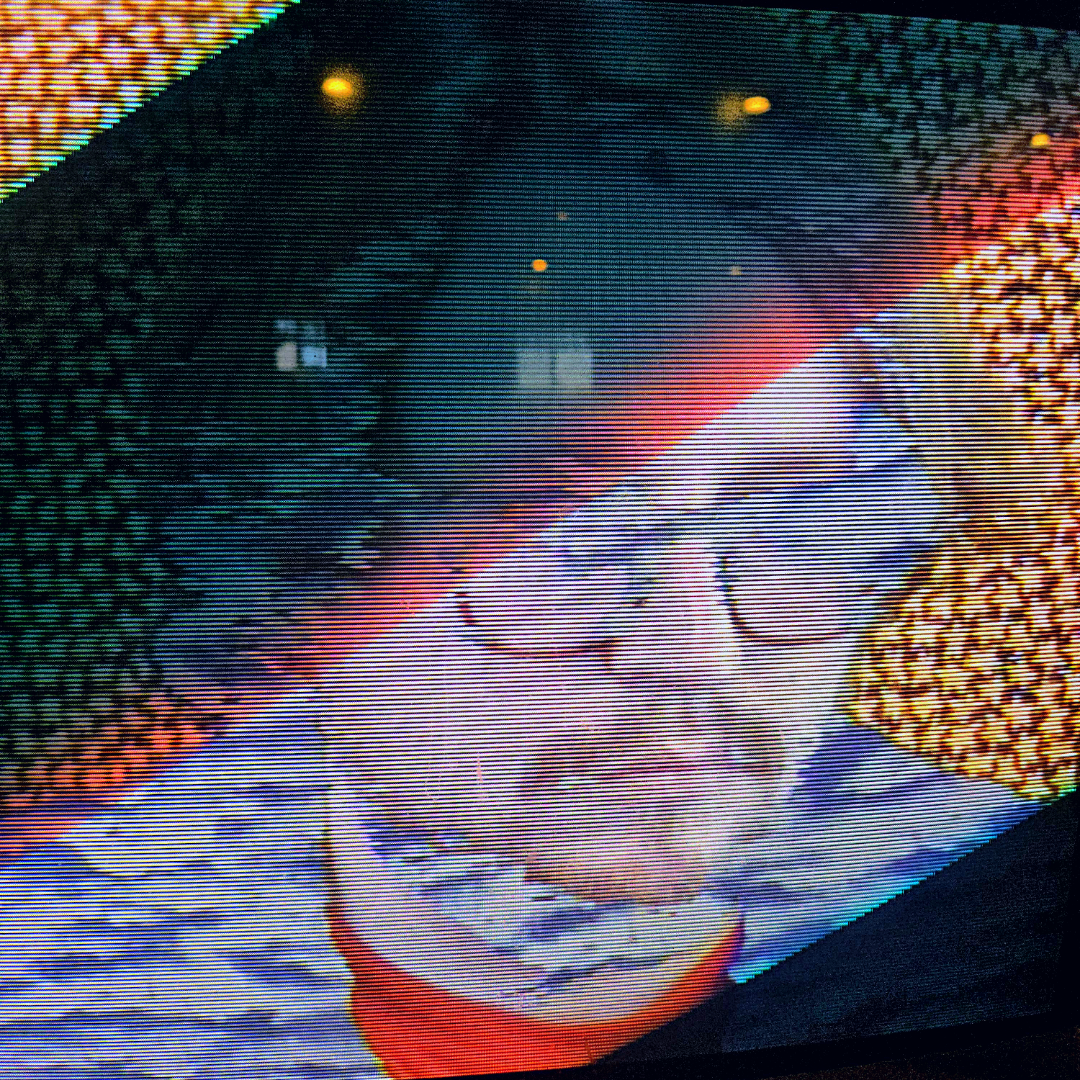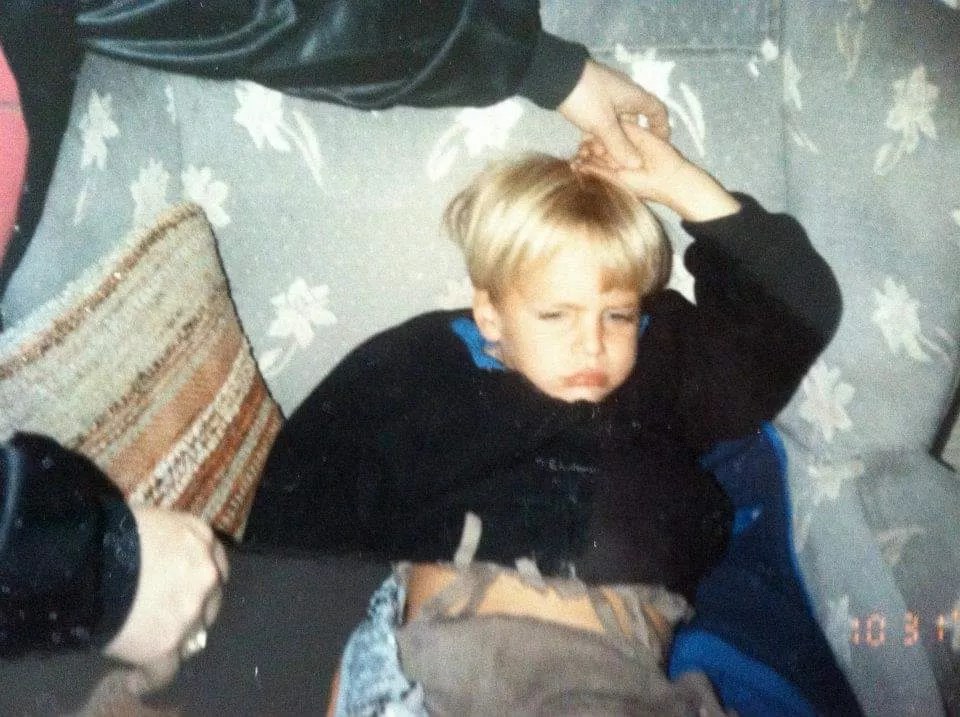
Courtesy of Andrew Cline

Audio By Carbonatix
(Author’s note) I chose to begin Secret History with this particular “first” doorway because it is arguably the most important moment of my musical life. It is the genesis of my identity. We are endeared to one another by these experiences. I chose to take up a pen and begin an ongoing correspondence regarding these most important and profound experiences of our lives.
A song can be a doorway to oneself. One of many doors in the ethereal glass houses of our life’s experiences, in fact, a song can be a living memory, a secret history. Some people remember smells: mom’s apple pie, wet grass in the springtime. Others remember baseball stats, movie quotes. Then there are we lucky few, the invariably attractive and intelligent folks who view our lives through the prism of songs. I’m opening one of my proverbial doors for you, my first. That I can remember anyway.
I am sitting next to my mother. We are in a blue Toyota Corolla.
My name is Andrew. My mom calls me Drew and refuses to call me Andy. I am four. Light is softly shining through a thin, worn blanket, which is over my head. The blanket is zippered, but the zipper is long broken. I was carried home from the hospital in this blanket; it used to be white but is now a weathered, dull gray. I suck my thumb and hold a small snatch of this blanket between my thumb and two fingers. The light of the day illuminates the inside of this small room underneath the veil of my blanket. There are small balloons of red and blue; the light makes them transparent, flickering with the bustling of the outside world going by.

Andrew Cline on the set of Astrologer’s “Bang Bang Orangutang” video, Los Angeles, 2022.
Courtesy of Andrew Cline
A sound I have never heard before is happening beyond the veil. A synthesizer is blooming strings: the strings of romance, of perennial love stories. I am small, but I understand what I feel. I am immersed in a melancholy that outpaces my experiences by a lifetime. Somehow, I understand. The strings swelled, and a doorway was created. The one we are standing in now.
“Every time I think of you, I feel shot right through with a bolt of blue…”
Bruce Springsteen famously said hearing the opening snare hit of Dylan’s “Like a Rolling Stone” was like “someone kicked open the door to your mind,” and for music obsessives like us, dear reader, this sentiment is laughably obvious. Like in comedy, it’s funny because it’s true! My door was kicked in 1990, sitting beside my mom in her car, hearing “Bizarre Love Triangle” for the first time.
Incidentally, the song itself was a doorway for its own creators, New Order. In 1986, when “Triangle” came out, the band was still forging its own path out of the shadow of its past life. Their previous band, the eternally doomed Joy Division, was monochromatic and brooding. In the wake of their singer’s 1980 suicide, they became a monolithic icon of tragedy, contextualizing an image of Manchester so ubiquitously dismal that they themselves battled to be free of it after the fact. Their early records dwelled within arm’s reach of the Joy Division sound, awash in grief and feeling around in the dark for direction. “Blue Monday” is as comfortably cold as any Joy Division song, as are many of the songs that preceded it.
However, by the mid-eighties, singles like “Thieves Like Us” and “The Perfect Kiss” were setting the stage for a more romantic, pastel-hued vision of the band. In retrospect, “Bizarre Love Triangle” served as not only a commercial breakthrough but a symbolic one, crystallizing a new and original perspective, effectively bringing to fruition the impetus of their name. Through the song’s unabashed, multicolored exultance, New Order gave birth to themselves.
What Springsteen knew about Dylan, what New Order knew about Joy Division, and what we know as listeners, is evident: songs are doorways, and they can serve to enlighten both the creator and audience. They are more than important, more than profound. They are instruments of the metaphysical. They are lucid dreams, defying time and space, and yet, awakening us intermittently throughout our lives. And, lucky for us, we can access them at any time.
Back in 1990, I take the blanket off to look at the radio. I take in what I’m hearing. I like this feeling. I’ve never felt this kind of excitement. I have no thousand-word essay; I simply feel good. I look out the window and watch what Ray Davies called “moving pictures.” Phone lines are drawn across the sky, weaving together and apart, and I am thrilled by just being. I drift into fantasy. I daydream, something I will spend a great deal of time doing from now on.
Hearing “Bizarre Love Triangle” for the first time remains an especially important memory for me; it deftly alluded to new, exciting feelings I hadn’t experienced in my four-year existence, but I sure wanted to! I have earlier memories of hearing music, of course: I heard “Roxanne” by the Police, and it was committed to my memory because my babysitter was named Roxanne. Naturally, it had to be about her! I have similar memories of songs by Phil Collins, Tom Petty, and other hitmakers of the day. What made “Triangle” special was the nature of the song’s spirit: lovelorn and laced with a thread of wistful melancholy. Fittingly, my love for doo wop and new wave knows no bounds, trading in the melodramas of romance and loss. Those are my favorite kinds of songs, even now, as both a songwriter and listener. I’m an embarrassingly sentimental man, to be honest. Just ask my wife. I cry when I listen to music. I cry at movies. Sometimes I conjure purposefully sad memories and cry, well, just because.

Andrew Cline in 1991.
Courtesy of Andrew Cline
Throughout my life, there have been hundreds of songs that have impacted and inspired me. I suspect the impact felt greater in my youth because it was a series of firsts. I still hear songs that throw me for a loop, but not quite as often. Those, too, carry their own unique sense of joy, but the firsts are fantastic and singular: first sad song, first love song, first rave up. First Beatles, first Zeppelin, first Ramones. They sadly can’t all be firsts, unless they’re first, that is!
I heard “Dreamer” by Livin’ Joy on my way to school in 1993. I never found out who it was at the time, and didn’t find out for 25 years. I loved it so much when I heard it that I remembered it for over two decades until I finally was able to locate the artist and song title. That’s neither here nor there, I suppose.

Andy & Candy.
Courtesy of Andrew Cline
Another happy accident: I heard the Breeders’ song “Cannonball” on the radio many times between 1993 and 1995; it was a massive hit, and I loved it. One day in 1995, sitting outside a convenience store in my dad’s Celica, “Cannonball” came on the radio. I made it a point to listen for the DJ to say who it was so I could buy the album (as of 1993, I bought my own tapes). The DJ, however, mistakenly said the song was by Elastica, so I went to the store and bought the brand-new debut Elastica album, which became one of my most enduring influences. It’s still one of my all-time favorite albums. Obviously, it didn’t have “Cannonball,” but by the time I had listened to the album all the way through, I didn’t even care. I never ended up buying the album that housed “Cannonball” (“Last Splash”) until my late teens. Last Splash is a great album, but Elastica proved monumentally important in my life. Oddly, those memories are now so deeply intertwined that they are inextricable from one another. Another doorway.